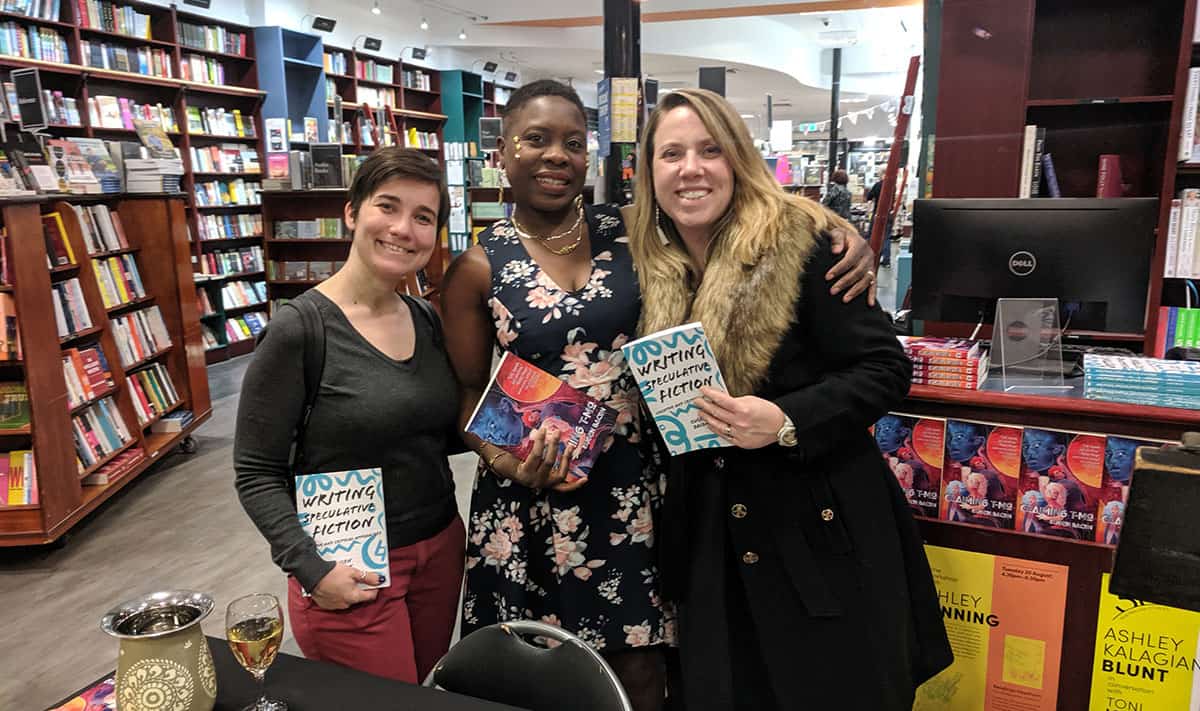With over one hundred published short stories and articles, as well as two books under her belt, Eugen Bacon is one of Australia’s busiest speculative fiction writers. I caught up with Eugen at the book launch for her speculative fiction debut novel, Claiming T-Mo, and was keen to have her on my blog ASAP. If you’ve had the pleasure of hearing Eugen speak about writing, she talks with such passion that it makes you want to write more.
Claiming T-Mo is a “lush interplanetary tale”, where an immortal priest flouts the conventions of a matriarchal society by choosing a name for his child. The act initiates chaos that splits the boy in two, unleashing a Jekyll-and-Hyde child upon the universe: named T-Mo by his mother and Odysseus by his father. With a first line like “T-Mo happened exactly one week after the puzzle-piece woman with fifty-cent eyes,” it’s hard not to be intrigued.

Kat: What got you interested in speculative fiction? Was there a moment where you said, I want to write that?
Eugen: As I child I remember The Six Million Dollar Man (TV series 1974-1978), and the incredible crush I had on Steve Austin (Lee Majors). And, oh, when the storyline intersected with Bionic Woman (TV series 2007), I wanted to be Jaimie Sommers (Lindsay Wagner). In those days, you didn’t have black speculative hero/ines—not like the ones we know.
But I found mine in the animal world of ‘how’ and ‘why’ stories: How the Lion Got His Roar. How the Tortoise Got His Shell… And then there were stories told in twilight of night runners with powers of the occult, of spirit folk who rode crocodiles across the river to steal men, women and children as they slept in their huts… It was only natural that one day I would meander into speculative fiction and find liberation in its lively, mystic and borderless world.
Kat: You’re a genre bending author and Claiming T-Mo takes much from many genres including literary and speculative fiction. What do you say to people trying to categorise your work? Are genres relevant in this age of hybrid fictions?
Eugen: Let publishers and booksellers worry about categorising the work for the commercial purpose of its placement on a bookshelf. If you’re looking for a story that espouses the playfulness of storytelling, that entwines itself around what French literary theorist, critic and philosopher Roland Barthes terms le plaisir du texte, I say unlock your mind.
Author Richard Mathews writes about ‘infinite possibility’ in his book Fantasy: The Liberation of Imagination. Beyond the ordinary, unhindered by rules of traditional genre, isn’t it sublime to find there are no pure genres?
Kat: You’ve come out with two books this year, which is an epic achievement for any author. How do you manage your time with personal commitments, writing, editing and publicity?
I steal time. Every day. I write as if it’s my last.

Kat: The book launch raised an interesting point about process, in that you don’t plan but are very focused when you’re writing a novel. I’ve read that for Zadie Smith and many other authors, there is nothing but the book – it becomes their world. Could you expand a little more about how you approach a novel, and when you’re writing, how intensely do you work on it?
Eugen: My approach to a story—be it a novel, a short story, a piece of prose poetry or an article—is with a sense of urgency. Dominique Hecq, a wonderful friend and mentor (she was my doctorate supervisor), articulates it best. She says that she writes to answer incipient questions troubling her mind, or to relieve some form of anxiety where cause may not yet be symbolised. She states, ‘I write because I must do so, exhilarating, detestable or painful though this might be.’
Like Hecq, I write to find. The urgency to find it drives the intensity.
Kat: Toni Morrison has been a big influence on your work. Are there any other black speculative fiction writers who have influenced you? (Octavia Butler is a personal favourite of mine.)
Eugen: Margaret Ogola. Chinua Achebe. Ngugi wa Thiong’o. Camara Laye. Nisi Shawl. Samuel R. Delaney. N. K. Jemisin. Octavia Butler—yes.
And not quite black: Michael Ondaatje. Peter Temple.
But I don’t look for colour when I read. The prose—it lures me like a snake charm.
Claiming T-Mo has just been released by Meerkat Press, and you can buy a copy at the following sites:
Amazon | Barnes & Noble | Book Depository | Goodreads

Share your thoughts